Cristina Feier
Efficiency of Query Evaluation Under Guarded TGDs: The Unbounded Arity Case
Jan 27, 2021
Abstract:The paper analyzes the parameterized complexity of evaluating Ontology Mediated Queries (OMQs) based on Guarded TGDs (GTGDs) and Unions of Conjunctive Queries (UCQs), in the setting where relational symbols might have unbounded arity and where the parameter is the size of the OMQ. It establishes exact criteria for fixed-parameter tractability (fpt) evaluation of recursively enumerable classes of such OMQs (under the widely held Exponential Time Hypothesis). One of the main technical tools introduced in the paper is an fpt-reduction from deciding parameterized uniform CSPs to parameterized OMQ evaluation. A fundamental feature of the reduction is preservation of measures which are known to be essential for classifying classes of parameterized uniform CSPs: submodular width (according to the well known result of Marx for unbounded-arity schemas) and treewidth (according to the well known result of Grohe for bounded-arity schemas). As such, the reduction can be employed to obtain hardness results for evaluation of classes of parameterized OMQs both in the unbounded and in the bounded arity case. Previously, in the case of bounded arity schemas, this has been tackled using a technique requiring full introspection into the construction employed by Grohe.
From Conjunctive Queries to Instance Queries in Ontology-Mediated Querying
Oct 22, 2020Abstract:We consider ontology-mediated queries (OMQs) based on expressive description logics of the ALC family and (unions) of conjunctive queries, studying the rewritability into OMQs based on instance queries (IQs). Our results include exact characterizations of when such a rewriting is possible and tight complexity bounds for deciding rewritability. We also give a tight complexity bound for the related problem of deciding whether a given MMSNP sentence is equivalent to a CSP.
When is Ontology-Mediated Querying Efficient?
Mar 17, 2020
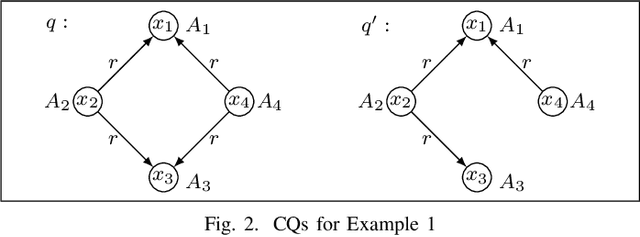
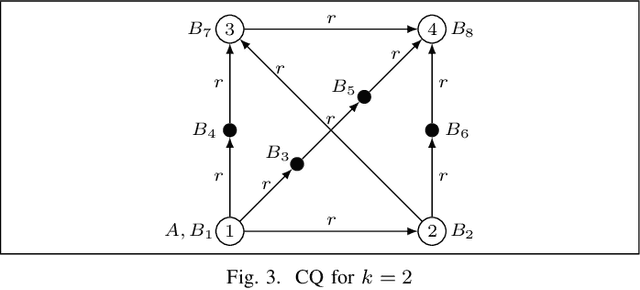
Abstract:In ontology-mediated querying, description logic (DL) ontologies are used to enrich incomplete data with domain knowledge which results in more complete answers to queries. However, the evaluation of ontology-mediated queries (OMQs) over relational databases is computationally hard. This raises the question when OMQ evaluation is efficient, in the sense of being tractable in combined complexity or fixed-parameter tractable. We study this question for a range of ontology-mediated query languages based on several important and widely-used DLs, using unions of conjunctive queries as the actual queries. For the DL ELHI extended with the bottom concept, we provide a characterization of the classes of OMQs that are fixed-parameter tractable. For its fragment EL extended with domain and range restrictions and the bottom concept (which restricts the use of inverse roles), we provide a characterization of the classes of OMQs that are tractable in combined complexity. Both results are in terms of equivalence to OMQs of bounded tree width and rest on a reasonable assumption from parameterized complexity theory. They are similar in spirit to Grohe's seminal characterization of the tractable classes of conjunctive queries over relational databases. We further study the complexity of the meta problem of deciding whether a given OMQ is equivalent to an OMQ of bounded tree width, providing several completeness results that range from NP to 2ExpTime, depending on the DL used. We also consider the DL-Lite family of DLs, including members that admit functional roles.
The Limits of Efficiency for Open- and Closed-World Query Evaluation Under Guarded TGDs
Dec 28, 2019Abstract:Ontology-mediated querying and querying in the presence of constraints are two key database problems where tuple-generating dependencies (TGDs) play a central role. In ontology-mediated querying, TGDs can formalize the ontology and thus derive additional facts from the given data, while in querying in the presence of constraints, they restrict the set of admissible databases. In this work, we study the limits of efficient query evaluation in the context of the above two problems, focussing on guarded and frontier-guarded TGDs and on UCQs as the actual queries. We show that a class of ontology-mediated queries (OMQs) based on guarded TGDs can be evaluated in FPT iff the OMQs in the class are equivalent to OMQs in which the actual query has bounded treewidth, up to some reasonable assumptions. For querying in the presence of constraints, we consider classes of constraint-query specifications (CQSs) that bundle a set of constraints with an actual query. We show a dichotomy result for CQSs based on guarded TGDs that parallels the one for OMQs except that, additionally, FPT coincides with PTime combined complexity. The proof is based on a novel connection between OMQ and CQS evaluation. Using a direct proof, we also show a similar dichotomy result, again up to some reasonable assumptions, for CQSs based on frontier-guarded TGDs with a bounded number of atoms in TGD heads. Our results on CQSs can be viewed as extensions of Grohe's well-known characterization of the tractable classes of CQs (without constraints). Like Grohe's characterization, all the above results assume that the arity of relation symbols is bounded by a constant. We also study the associated meta problems, i.e., whether a given OMQ or CQS is equivalent to one in which the actual query has bounded treewidth.
A Practical Acyclicity Notion for Query Answering over Horn-SRIQ Ontologies
Apr 19, 2018
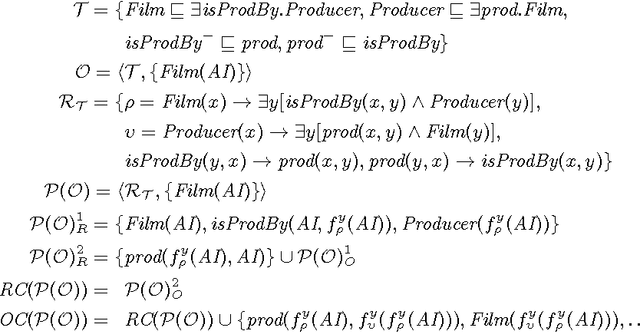
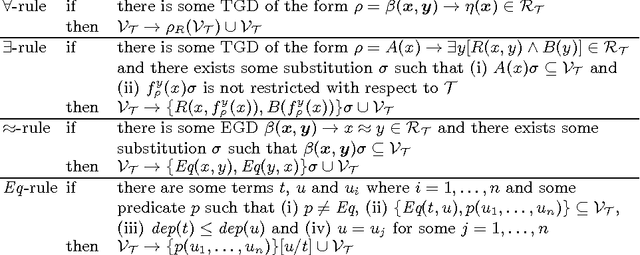
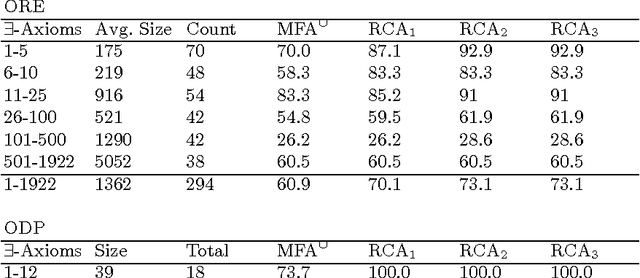
Abstract:Conjunctive query answering over expressive Horn Description Logic ontologies is a relevant and challenging problem which, in some cases, can be addressed by application of the chase algorithm. In this paper, we define a novel acyclicity notion which provides a sufficient condition for termination of the restricted chase over Horn-SRIQ TBoxes. We show that this notion generalizes most of the existing acyclicity conditions (both theoretically and empirically). Furthermore, this new acyclicity notion gives rise to a very efficient reasoning procedure. We provide evidence for this by providing a materialization based reasoner for acyclic ontologies which outperforms other state-of-the-art systems.
 Add to Chrome
Add to Chrome Add to Firefox
Add to Firefox Add to Edge
Add to Edge